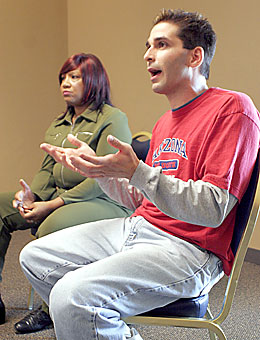 |
|
MATT ROBLES/Arizona Daily Wildcat
|
Dominick DeCarlo, right, a UA alumnus, and singer Pepper Mache speak about gay rights issues at the Student Union Memorial Center Friday afternoon. DeCarlo was the first UA student to start a gay fraternity.
|
|
|
By Jennifer Amsler
Arizona Daily Wildcat
Monday, November 22, 2004
Print this
The founder of the first gay fraternity at the UA encouraged gay students Friday to bring it back to help unify the gay student population.
Dominick DeCarlo said creating a Delta Lambda Phi chapter was the most controversial thing to happen at the UA during the early '90s.
He began the fraternity in 1990 but it stopped operating in 1993, just one year after DeCarlo graduated.
Although the UA Delta Lambda Phi chapter stopped operating more than a decade ago, DeCarlo encouraged gay men at the UA Friday to start it up again. About 10 men attended DeCarlo's speech, and some expressed interest in doing that.
"I would love to see it back," DeCarlo said. "It was about learning about yourself and giving thanks to the older generation that paved the way for us."
DeCarlo stressed the need for a gay fraternity because many gay men want a fraternal experience, but often times feel the need to act the part of a heterosexual.
Some men at the gathering Friday agreed the reason they did not join fraternities was because they didn't want to feel pressure to "fit that mold."
DeCarlo said he started the chapter after he was kicked out of Kappa Sigma Fraternity in 1990 two weeks prior to initiation because he was at a local gay bar.
DeCarlo, an openly gay student when he joined the fraternity, said a rule in Kappa Sigma stated that members weren't allowed to wear their pins while they were drinking. DeCarlo, however, said he wasn't drinking and believes the reason for his dismissal was because he was gay.
"I had the highest GPA of any pledge. I kept probing them for answers, and I never really got one," he said.
Undaunted by the incident, DeCarlo still wanted a fraternal experience so he started UA's first gay fraternity shortly after the incident.
Ten percent of the population is gay, but 30 percent of men in fraternities are gay, DeCarlo said. He said the reason for this is fraternities are a good way to bond and be around other men.
He said when he attended the UA from 1990 to 1992, many fraternity men were gay and he even dated a few of them, including the then-president of Pi Kappa Alpha.
"There was a lot of us floating around the fraternal community," DeCarlo said.
DeCarlo said he had to overcome the stereotypes of creating a gay fraternity because many people thought it was just an attempt to create a dating circle.
Eventually, people came around to accepting the fraternity and even received a standing ovation from fraternity and sorority presidents when he formally addressed them during a panel that Delta Lambda Phi had been approved for a charter.
DeCarlo said the members of the fraternity had a great experience and got along well with all of the sororities, especially when they went to serenade the women to Madonna's "Express Yourself."
"One of the lines was, 'You don't have to worry about pregnancy tests with us,'" he said.
DeCarlo also stressed the importance of uniting the gay community on campus with the rest of the students. He said bringing back Delta Lambda Phi would help accomplish that.
Pepper Mache, an entertainer who sang the theme song to "Queer as Folk," a television show about gay men, said she and DeCarlo are working together to begin a talk show that targets the lesbian, gay, bisexual and transgendered community.
"It would be a showcase for talent," she said.
Mache said there are many LGBT individuals who are talented entertainers but don't have the opportunity to be seen or heard because their sexual orientation is not mainstream.
Ben Rieck, a finance senior, is a member of Campus Crusades for Christ and said he sees a barrier between the Christian community and the gay community. Although Rieck is heterosexual, he said has been working with Pride Alliance, a group that fosters a safe and educational environment for LGBT individuals, to break down that barrier.
"It's been an overwhelmingly positive experience," Rieck said.
